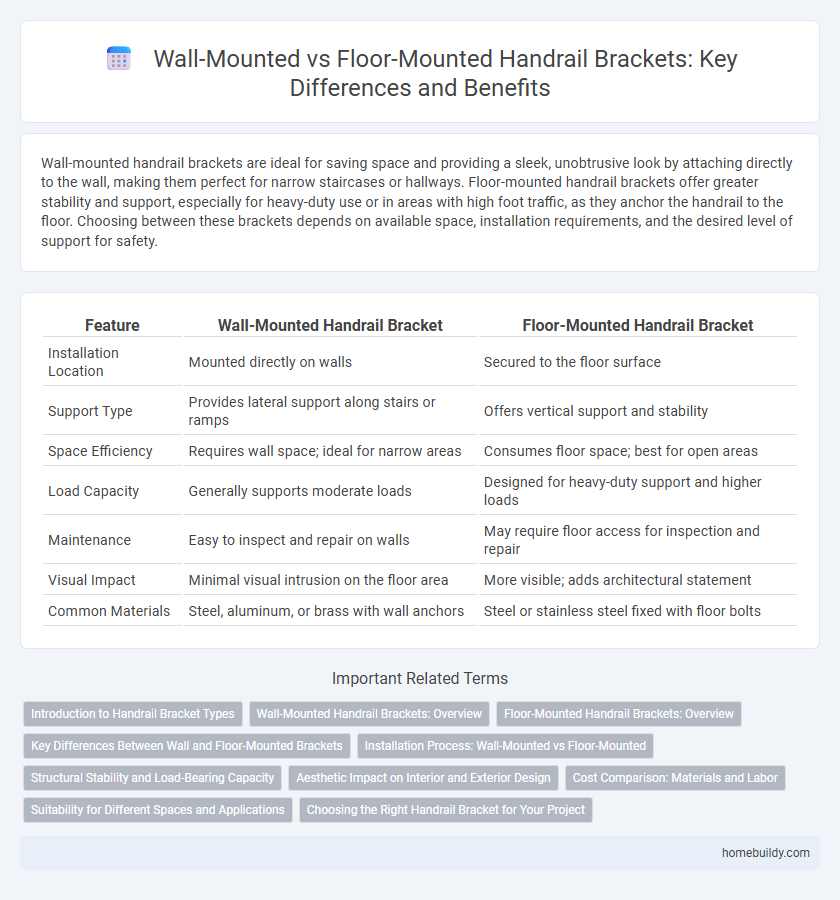Wall-mounted handrail brackets are ideal for saving space and providing a sleek, unobtrusive look by attaching directly to the wall, making them perfect for narrow staircases or hallways. Floor-mounted handrail brackets offer greater stability and support, especially for heavy-duty use or in areas with high foot traffic, as they anchor the handrail to the floor. Choosing between these brackets depends on available space, installation requirements, and the desired level of support for safety.
Table of Comparison
| Feature | Wall-Mounted Handrail Bracket | Floor-Mounted Handrail Bracket |
|---|---|---|
| Installation Location | Mounted directly on walls | Secured to the floor surface |
| Support Type | Provides lateral support along stairs or ramps | Offers vertical support and stability |
| Space Efficiency | Requires wall space; ideal for narrow areas | Consumes floor space; best for open areas |
| Load Capacity | Generally supports moderate loads | Designed for heavy-duty support and higher loads |
| Maintenance | Easy to inspect and repair on walls | May require floor access for inspection and repair |
| Visual Impact | Minimal visual intrusion on the floor area | More visible; adds architectural statement |
| Common Materials | Steel, aluminum, or brass with wall anchors | Steel or stainless steel fixed with floor bolts |
Introduction to Handrail Bracket Types
Wall-mounted handrail brackets attach directly to walls, providing a streamlined and space-saving solution ideal for narrow stairways and corridors. Floor-mounted handrail brackets offer enhanced stability by securing the handrail to the floor, making them suitable for heavy-duty applications and exterior staircases. Choosing between wall-mounted and floor-mounted brackets depends on structural support, aesthetic preference, and safety requirements.
Wall-Mounted Handrail Brackets: Overview
Wall-mounted handrail brackets are secured directly to walls, offering a sleek and space-saving solution for handrail installation. These brackets provide strong support by anchoring to wall studs or solid masonry, ensuring stability and durability. Ideal for staircases and corridors with limited floor space, wall-mounted brackets enhance safety without obstructing the walking area.
Floor-Mounted Handrail Brackets: Overview
Floor-mounted handrail brackets provide enhanced stability by anchoring directly into the floor, making them ideal for heavy-duty handrail systems and high-traffic areas. These brackets distribute weight more effectively, reducing strain on walls and offering greater durability in commercial and industrial settings. Installation requires precise floor drilling and anchoring to ensure secure support for safety and long-term performance.
Key Differences Between Wall and Floor-Mounted Brackets
Wall-mounted handrail brackets attach directly to the wall, offering a streamlined and space-saving design ideal for tight stairways and corridors. Floor-mounted handrail brackets are anchored to the floor, providing enhanced stability and support suitable for heavy-duty applications or open staircases. The choice depends on structural requirements, aesthetic preferences, and the specific load-bearing needs of the handrail installation.
Installation Process: Wall-Mounted vs Floor-Mounted
Wall-mounted handrail brackets require secure attachment to studs or masonry for stable support, often involving drilling and anchoring directly into the wall surface. Floor-mounted handrail brackets necessitate precise floor surface preparation and anchoring with heavy-duty bolts to ensure stability, especially on concrete or wooden floors. Installation of wall-mounted brackets is generally quicker and less invasive, while floor-mounted options demand more complex measurements and sturdy subfloor conditions for optimal safety.
Structural Stability and Load-Bearing Capacity
Wall-mounted handrail brackets offer robust structural stability by anchoring directly into wall studs or masonry, providing firm support ideal for residential and commercial applications with moderate to heavy use. Floor-mounted handrail brackets excel in load-bearing capacity by distributing weight into the floor, making them suitable for high-traffic areas or staircases requiring maximum stability. Both types ensure safety, but floor-mounted brackets typically handle greater dynamic loads and impact forces due to their direct floor attachment.
Aesthetic Impact on Interior and Exterior Design
Wall-mounted handrail brackets offer a sleek, minimalistic aesthetic that integrates seamlessly with interior and exterior walls, preserving clean lines and enhancing modern design schemes. Floor-mounted handrail brackets provide a robust, architectural statement, often complementing industrial or contemporary spaces with their visible structural presence. Choosing between the two depends on the desired balance between subtlety and boldness in handrail design within various environments.
Cost Comparison: Materials and Labor
Wall-mounted handrail brackets typically cost less in materials and labor due to simpler installation requiring fewer structural modifications. Floor-mounted handrail brackets involve higher expenses, as they demand sturdy anchoring to the floor and may require additional support elements and professional labor. Material costs for floor-mounted options are generally higher given the need for heavier-duty components to ensure stability and compliance with safety standards.
Suitability for Different Spaces and Applications
Wall-mounted handrail brackets offer versatility for narrow corridors and staircases, providing secure support without occupying floor space, making them ideal for residential and commercial interiors with limited clearance. Floor-mounted handrail brackets are better suited for open areas and exterior applications where structural stability and load-bearing capacity are critical, such as ramps or large landings. Choosing between wall-mounted and floor-mounted options depends on spatial constraints, usage frequency, and installation surface material.
Choosing the Right Handrail Bracket for Your Project
Wall-mounted handrail brackets are ideal for spaces with limited floor area, providing sturdy support by attaching directly to the wall studs, ensuring a secure and streamlined installation. Floor-mounted handrail brackets offer enhanced stability for heavy-use areas or outdoor settings, as they anchor into the floor, making them suitable for staircases or ramps requiring greater durability. Choosing the right handrail bracket depends on the structural requirements, space constraints, and aesthetic preferences of your project, balancing safety with design functionality.
wall-mounted handrail bracket vs floor-mounted handrail bracket Infographic

 homebuildy.com
homebuildy.com